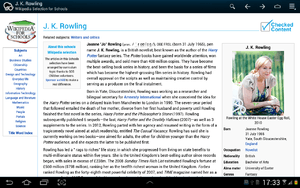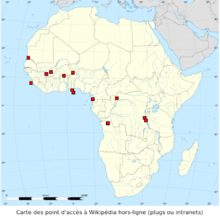Kiwix
Kiwix is a free and open-source offline web browser created by Emmanuel Engelhart and Renaud Gaudin in 2007.[4] It was first launched to allow offline access to Wikipedia, but has since expanded to include other projects from the Wikimedia Foundation as well as public domain texts from Project Gutenberg. Available in more than 100 languages, Kiwix has been included in several high-profile projects, from smuggling operations in North Korea[5] and encyclopedic access in Cuba[6] to Google Impact Challenge's recipient Bibliothèques Sans Frontières.[7]
 | |
 | |
| Developer(s) | Emmanuel Engelhart Renaud Gaudin |
|---|---|
| Stable release(s) | |
| Preview release(s) | |
| Repository | |
| Operating system | Android, iOS, macOS, Windows, Linux, Windows 10 Mobile |
| Size | |
| Available in | 100 languages[1] |
| License | GPLv3 |
| Website | kiwix |
History
Founder Emmanuel Engelhart sees Wikipedia as a common good, saying "The contents of Wikipedia should be available for everyone! Even without Internet access. This is why I have launched the Kiwix project."[4]
After becoming a Wikipedia editor in 2004, Engelhart became interested in developing offline versions of Wikipedia. A project to make a Wikipedia CD, initiated in 2003, was a trigger for the project.[4]
In 2012 Kiwix won a grant from Wikimedia France to build kiwix-plug, which was deployed to universities in eleven countries known as the Afripedia Project.[8][9] In February 2013 Kiwix won SourceForge's Project of the Month award[10] and an Open Source Award in 2015.[11]
Description
The software is designed as an offline reader for web content. It can be used on computers without an internet connection, computers with a slow or expensive connection, or to avoid censorship. It can also be used while travelling (e.g. on a plane or train).
Users first download Kiwix, then download content for offline viewing with Kiwix. Compression saves disk space and bandwidth. All of English-language Wikipedia, with pictures, fits on a USB stick (78 GB as of March 2020, or 16 GB with no pictures).[10][12]
All content files are compressed in ZIM format, which makes them smaller, but leaves them easy to index, search, and selectively decompress.
The ZIM files are then opened with Kiwix, which looks and behaves like a web browser. Kiwix offers full text search, tabbed navigation, and the option to export articles to PDF and HTML.[1]
There is an HTTP server version called kiwix-serve; this allows a computer to host Kiwix content, and make it available to other computers on a network.[13] The other computers see an ordinary website. Kiwix-hotspot is an HTTP server version for plug computers,[10] which is often used to provide a Wi-Fi server.[14]
Available content
A list of content available on Kiwix is available for download, including language-specific sublists.[16] Content can be loaded through Kiwix itself.
Since 2014, most Wikipedia versions are available for download in various different languages.[12] For English Wikipedia, a full version containing pictures as well as an alternative version containing text only can be downloaded from the archive. The servers are updated every two to ten months, depending on the size of the file. For English Wikipedia, the update frequency is thus substantially lower than the bzip2 database downloads by the Wikimedia Foundation, which are updated twice a month.[17]
Besides Wikipedia, content from the Wikimedia foundation such as Wikisource, Wikiquote, Wikivoyage, Wikibooks, and Wikiversity are also available for offline viewing in various different languages.[18]
In November 2014 a ZIM version of all open texts forming part of Project Gutenberg was made available.[19][20]
Besides public domain content, works licensed under a Creative Commons license are available for download as well. For example, offline versions of the Ubuntu wiki containing user documentation for the Ubuntu operating system,[21] ZIM editions of TED conference talks[22] and videos from Crash Course are available in the Kiwix archive as ZIM file formats.[23]
Deployments
Kiwix can be installed on a desktop computer as a stand-alone program, installed on a tablet or smartphone, or can create its own WLAN environment from a Raspberry Pi.
As a software development project, Kiwix itself is not directly involved in deployment projects. However, third party organizations do use the software as a component of their own projects. Examples include:

- Universities and libraries that can't afford broadband Internet access.[24]
- The Afripedia Project set up kiwix servers in French-speaking universities, some of them with no Internet access, in 11 African countries.[25]
- Schools[26] in developing countries, where access to the internet is difficult or too expensive.[10]
- Installed on computers used for the One Laptop per Child project.[4]
- Installed on Raspberry Pis for use in schools with no easy access to electricity in Tanzania[27] by the Tanzania Development Trust.
- Installed on tablets in schools in Mali as part of the MALebooks project.[28]
- Used by school teachers and university professors, as well as students, in Senegal.[29]
- Deployed in Benin during teacher training seminars run by Zedaga,[30] a Swiss NGO specialized in education.
- The Fondation Orange has used kiwix-serve in its own French language technological knowledge product they have deployed in Africa.[31]
- A special version for the organization SOS Children's Villages was developed, initially for developing countries, but it is also used in the developed world.
- At sea and in other remote areas:[10][15]
- On a train or plane.[10][36]
- In European and US prison education programs.[10]
Package managers and app stores

Kiwix was formerly available in the native package managers of some Linux distributions. However, Kiwix is currently not available in most package databases, due to XULRunner, a program on which Kiwix depends, being deprecated by Mozilla and removed from the package databases.[37] Kiwix is available in the Sugar and ArchLinux Linux distributions. It is also available on Android.
Kiwix is available in the Microsoft Store,[38] on Google Play,[39] and Apple's iOS App Store.[40] Since 2015, a series of "customized apps" have also been released, of which Medical Wikipedia and PhET simulations are the two largest.
See also
References
- "Kiwix". SourceForge. Retrieved 22 March 2012.
- Kiwix iTunes page
- "Kiwix JS". Windows Store. Microsoft.
- Sutherland, Joe. Emmanuel Engelhart, Inventor of Kiwix: the Offline Wikipedia Browser. In: Wikimedia Blog. 12 September 2014. Accessed on 26 November 2014.
- "The plot to free North Korea with smuggled episodes of "Friends"". Wired. Retrieved 27 April 2016.
- "¿Cómo utilizar Kiwix como servidor local?" (in Spanish). Retrieved 3 July 2017.
- "Les Lauréats du Google Impact Challenge". Retrieved 27 April 2016.
- Citazine article on Afripedia (in French)
- Traoré, Kardiatou. "Afripédia : un projet de promotion de Wikipédia en Afrique". www.afrik.com. Retrieved 8 March 2016.
- "Kiwix Aims to spread Wikipedia's Reach". Slashdot. 4 February 2013. Archived from the original on 2 March 2013. Retrieved 10 July 2013.
- "OSS Awards küren Schweizer Open-Source-Projekte". Netzwoche. Retrieved 8 December 2015.
- "Content in all languages - Kiwix". wiki.kiwix.org. Retrieved 8 August 2016.
- Kiwix-serve
- "Kiwix-plug - Kiwix". wiki.kiwix.org. Retrieved 8 March 2016.
- "Sailing the South Pacific with a copy of Wikipedia on board: The Goodall Family". Wikimedia Blog. Retrieved 8 March 2016.
- "Content in all languages - Kiwix". wiki.kiwix.org. Retrieved 2017-06-09.
- "Wikipedia Database download: English-language Wikipedia". Wikipedia. Retrieved 17 November 2017.
- Zim archive for Kiwix
- Engelhart, Emmanuel. 50.000 public domain books available to everybody, everywhere, offline. Wikisource-l-Mailinglist, Wikimedia Foundation. 19 November 2014. Accessed on 26 November 2014.
- "Words and what not: #Wikimedia & Project #Gutenberg - the sum of all knowledge". ultimategerardm.blogspot.ch. Retrieved 8 March 2016.
- Ubuntuusers Hilfsmittel
- Kiwix archive for TED
- Kiwix archive for additional content
- "Main Page - Kiwix". wiki.kiwix.org. Retrieved 8 March 2016.
- "Afripedia project increasing off-line access to Wikipedia in Africa". Wikimedia Blog. Retrieved 8 March 2016.
- "(fr) ASRI Education may 2013" (in French). Asri-education.org. Archived from the original on 20 July 2014. Retrieved 10 July 2013.
- "Raspberry Pi in Masekelo: Bringing Wikipedia to a school without electricity". Wikimedia Blog. Retrieved 8 March 2016.
- "Children in Mali can now read Wikipedia offline, thanks to MALebooks e-readers". Wikimedia Blog. Retrieved 8 March 2016.
- "West African schools will test Kiwix, the offline Wikipedia reader". Wikimedia Outreach Education Newsletter. Wikimedia Foundation. 31 August 2016. Retrieved 11 June 2017.
- "Kiwix is mentioned on the thank-you page". Zedaga (in French). Retrieved 11 June 2017.
- Fondation Orange: le programme "écoles numériques" Archived 5 April 2015 at the Wayback Machine.
- "Hans Oleander: Using offline Wikipedia to guide tours at the bottom of the Earth". Wikimedia Blog. Retrieved 11 June 2017.
- "Kiwix'le Wikipedia'ya ulaşmak hala mümkün". gazetekarinca.com (in Turkish). 5 May 2017. Retrieved 8 March 2016.
- "Navigatrix.net - A Voyager's Companion". navigatrix.net. Retrieved 8 March 2016.
- "Navigatrix – the first Linux distribution for cruisers". Your Cruising Editor. Retrieved 8 March 2016.
- Amarilli, Antoine. "A local copy of Wikipedia with Kiwix - a3nm's blog". a3nm.net. Retrieved 8 March 2016.
- "Debian". wiki.kiwix.org. Retrieved 6 January 2020.
- "Get Kiwix JS - Microsoft Store". Microsoft Store Online. Retrieved 12 February 2018.
- "Kiwix, Wikipedia offline - Android Apps on Google Play". Google Play. Retrieved 8 March 2016.
- "Kiwix on the App Store". App Store. Retrieved 8 March 2016.
External links
| Wikimedia Commons has media related to Kiwix. |
- Official website
- Kiwix on SourceForge.net
- Explanation of Kiwix from Wikimania 2013
- Kiwix stories on the Wikimedia Blog